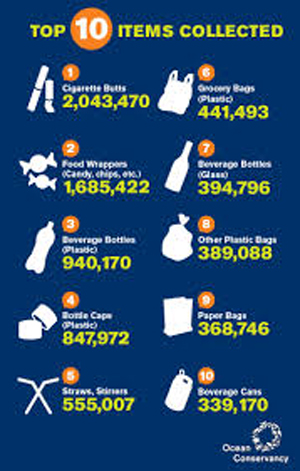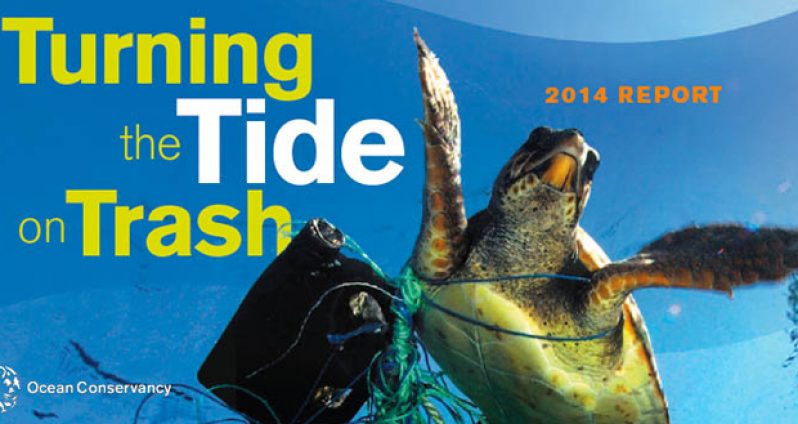INTERNATIONAL Coastal Cleanup (ICC) this year is being celebrated on Saturday, September, 20th, 2014. Under the theme: “Turning the Tide on Trash”. Ocean Conservancy has been the global organisation behind ICC for the past 28 years, bringing awareness to the tides of trash that wash up year after year affecting ocean dwellers, human lives and livelihood alike.Its aim is to engage citizens to remove trash and debris from beaches and waterways all around the world, identify the sources of debris, and change the behavioural patterns that contribute to pollution (www.oceanconservancy.org).
It is reported that over 100 million marine animals’ are killed each year due to plastic debris in the ocean. Our most affected ocean dweller is the sea turtle that often swallow balloons, plastic bags, nylon rope, Styrofoam, and bottle caps, among other articles, mistaking them for jellyfish. Once digested, the plastic causes a gut impaction which leads to the decomposing of the contents in the animals’ stomach.
“The animal becomes positively buoyant and it can’t dive down to eat, it can’t get out of the way of predators, it can’t get out of the way of boats, so it really is quite a tragic thing,”
It can result in so-called “floating syndrome”, where the turtle may take months to gradually starve to death.”It’s a really long, drawn-out, painful death,” Dr Townsend.
Human Health Impacts:Persons who visit the beaches and seawalls can be injured by stepping on broken bottles, cans, needles or other items. Also affected are swimmers and divers who sometimes can find themselves entangled in abandoned netting and fishing lines. Passengers on vessels that become entangled in floating nets or fishing lines may be injured or killed if the vessel is damaged or disabled
Economic Impacts: Marine debris defaces the aesthetics of our sea and its environs causing losses in tourism, fishing revenues as well as costly vessel repairs.
Most of the trash that ends up in the seas and rivers are land-based, meaning that they originate from points of deposit on the land. It is a common yet unlawful practice in our country for garbage to be deposited along the sides of trenches and canals – this is how much of the trash finds its way into our waterways. Our sea-walls are also abused daily by persons who uncaringly litter there.
As you no doubt are aware, it is an offence to litter!The EPA is actively enforcing its new Litter Prevention Regulations which makes it an offence to litter in a public place or from a moving vehicle.
It does not matter if littering is intentional or accidental; once the act is committed, the person responsible would be charged. Also if a person places litter in a public place not intended for garbage collection then this person would have committed an offence – the absence of a waste receptacle is not an excuse for littering! There is a hefty fine for littering offences ranging from fifty thousand ($50,000) to one-hundred thousand ($100,000) dollars.
Let’s keep our dignity, our money and our aquatic life – do not litter!
Share your ideas and questions by sending letters to: “Our Earth, Our Environment”, C/o EIT Division, Environmental Protection Agency, Ganges Street, Sophia, Georgetown; or email us at eit.epaguyana@gmail.com.



.jpg)








